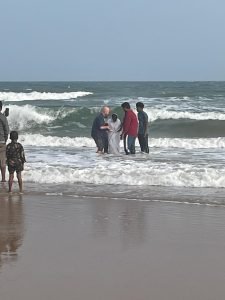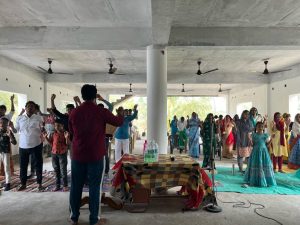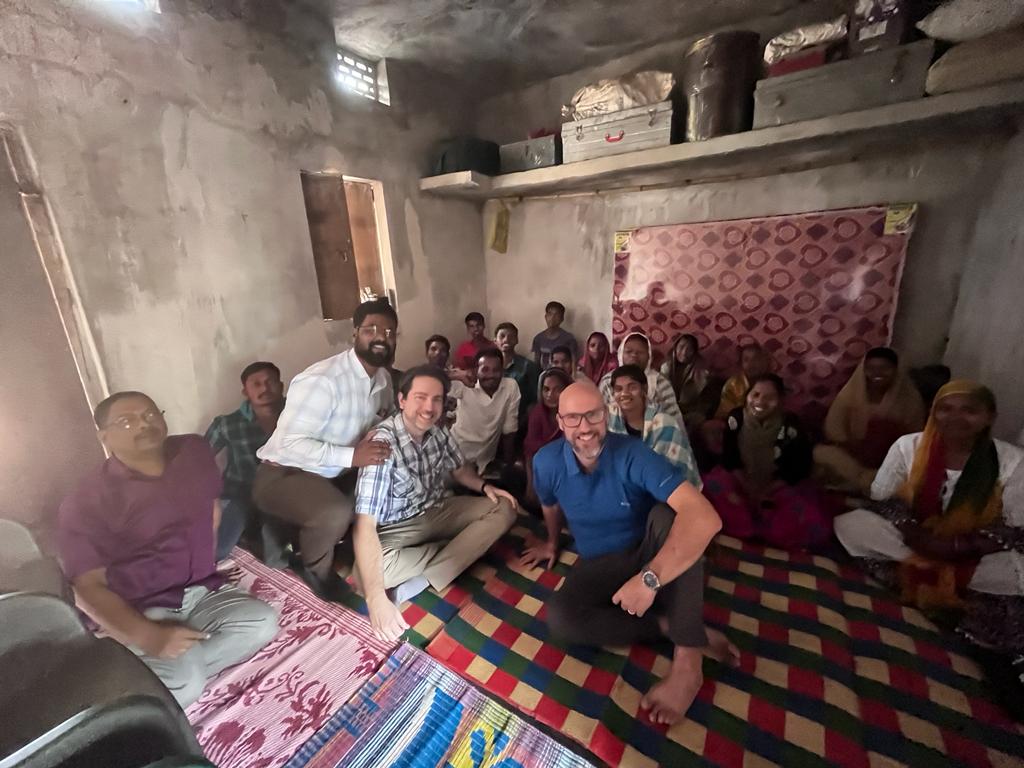When I was in elementary school, the only two words I loved hearing more than “let’s eat” was “field trip!” I still love field trips. While most of my time is spent training leaders in venues such as churches, halls, classrooms, and even under trees, I love to get out on the field occasionally to visit pastors in their own field of ministry. It helps me to see up close the challenges they face, to encourage them, and to celebrate their victories.
After completing a thrilling three days of training with thirty-five specially selected Indian pastors and church planters who came from all over Odisha state, it was field trip time. We started off the morning with a traditional Indian breakfast of fruit, curry, and puri at one of the pastor’s homes. If you’ve never has puri, you haven’t lived. It’s a light and flaky fried bread that melts in your mouth and along with the curry warms the cockles of your heart.
After breakfast, we were off to our first visit. Leaving behind the chaos of city life, soon the countryside pulsating with color and life opened before us like a lotus in bloom. The air clean and fresh, at least compared to the toxic air in the city, invigorated us. As we meandered down a narrow village road dodging motorbikes, rickshaws, dogs, and chickens, we soon heard a chorus of voices singing and the unmistakable ring of a tambourine (the favorite instrument of Indian Christians) in the distance and knew we had arrived.
The building was a simple concrete two-story structure, with the pastor’s room on the bottom floor and the meeting place on the top floor–or as the believer’s call it–the upper room. Indeed, the wind of Pentecost was blowing through the room as dozens of precious believers lifted their voices in song, banged the drums, and hammered their tambourines praising God for His great power and grace.
As we took off our shoes and found our seats at the front of the room, I realized that I have come to feel more comfortable and at home in rustic settings like these, than in the plush modern worship centers we have in America. Praise God for nice, well-furnished churches. Yet, it seems that far too often in such churches, the mission devolves into the maintenance of the edifice rather than reaching the lost and discipling the found. This loss of missional energy has exacerbated the steep decline of American Christianity.
Of course, there had to be sermons from the esteemed guests from America, so we did our best to encourage the saints to remain faithful to the Lord. Preaching with a translator is always challenging, but on this occasion, it was necessary to have two translators. So, we would preach in English, and it would be translated into Oria and then into Telegu. Let’s hope the message was not lost in translation.
Later we were informed that this is the only church in the entire village. In what has become a common refrain, we were also informed that these believers are continually harassed and persecuted by other villagers. One common way believers are persecuted in villages such as this is that no one will rent to them. Therefore, believers are always on the edge of homelessness. Additionally, many Christian men remain single long into adulthood since no one in the village will allow their daughters to marry a Christian man.
After a fiery but delicious lunch of Chicken Biriyani on the church grounds, we packed into a rickshaw and headed down the road for a short drive to the Bay of Bengal where we would be baptizing two new believers. One was an old woman in her seventies who had recently come to Christ. The other a boy who had told his science teacher about Christ. The teacher’s interest sparked, he came to the church, heard the gospel, and was converted. I typically don’t like to baptize pre-adolescent children, but I figure if the kid led his science teacher to Christ, then he’s ready for baptism.
Baptism celebrations in the Global South are quite different from ours in America. They begin with a long procession of worshipers singing and shaking tambourines leading the new converts down to the water. While the weather was perfect, the sea was quite rough. Also, many Indians don’t know how to swim. Therefore, it is a real step of faith to get into the ocean. A rather humorous moment occurred when I prepared to dunk the old woman and she let out a blood curdling scream. Nevertheless, she emerged from the waters unharmed and baptized into the fellowship of the redeemed.

But our day was not done yet. We attended a special service in the home of one of the church members and then made a few house visits to other members. Finally, it was back to our place of lodging to rest for the night. Unfortunately, the hotel chosen for us was what we might call rustic. There was no toilet paper to be found anywhere in the room, nor towels nor cloths. When I asked the front desk about the toilet paper, the man looked at me like I was from Mars. “No toilet paper in the hotel,” he said. Fortunately, we were able to purchase some from the store down the street so all ended well. I won’t even tell you about the stained mattress and pillows, but I guess I just did. I did happen to find a cloth in my bag, which I deftly used to wrap around my pillow. I suppose my exhaustion was a mercy from God because at that point I didn’t care about the mattress. I just wanted to lay down.
On our final day of the field trip, we traveled some distance to a mountainous region where some 200,000 people live spread out into forty different villages. The terrain is difficult, but the vista is spectacular. Cool mountain breezes invigorated our mission. Only three Christian churches of any kind exist in this whole region, two of which were planted by one of our pastors in the training cohort. That means thirty-seven villages in this area have no gospel witness. Yet, several pastors participating in our cohort are working together and have embarked on a strategy to reach the remaining villages.
The scenes of the village are earthy and sometimes heartbreaking, such as the puppy lying in front of the hut we were about to enter dying from neglect. Having entered the simple, unadorned two-room hut of the home in which one church meets, we all sat on a crude mat covering the concrete and tried not to draw attention to the flies and mosquitoes buzzing all around us. However, we soon forgot about the pests as we began to hear testimony upon testimony of how Christ had delivered these new believers them from the power of sin and idolatry and claimed them as His own. Bereft of worldly goods, they are rich in heavenly treasure.
As I sat on the floor, humbled by what I had encountered, an overwhelming sense of gratitude began to pervade my being. Not only for what Christ has done for these precious Indian believers, but also for the critical role that ITEM is privileged to play in the forgotten places around the world. Yet, I’m also reminded of how much work remains. Therefore, let us work while it is day. For the night comes when no man can work (John 9:4).
On a final note, the hut has a very small entry door. I said to myself when entering the doorway, “I’m probably going to bang my head against the beam when I exit.” True to my intuition, I casually exited the door and then “WHACK!” An audible gasp rose from the poor villagers and the women quickly covered my head chattering away in Oria. After the stars had ceased circling around my brain, I assured them that I was okay, and this is one of those times when being hard-headed is a blessing.

It’s been an incredible trip. My heart is full and my vision clear. It’s on to Nepal tomorrow. Until then, good night from Bhubaneswar, India!
